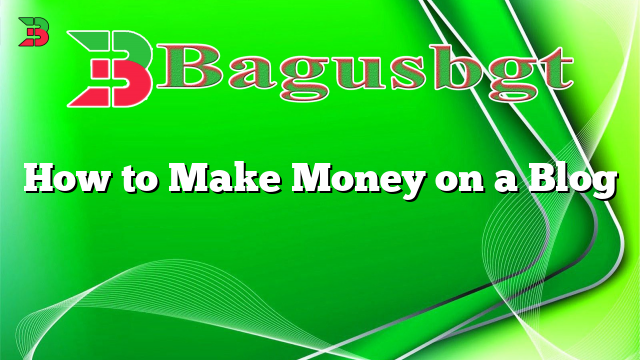Hello readers,
Welcome to this informative article on how to make money on a blog. In this digital era, blogging has become a popular platform for individuals to share their thoughts, experiences, and expertise. However, did you know that blogging can also be a great source of income? In this article, we will discuss ten effective strategies to monetize your blog and turn it into a profitable venture.
1. Affiliate Marketing
Affiliate marketing is a popular method for bloggers to earn money. By partnering with companies and promoting their products or services on your blog, you can earn a commission for every sale made through your unique affiliate link. The key to success in affiliate marketing is to choose products or services that align with your blog’s niche and have a strong potential for sales.
Advantages:
- Potential for passive income.
- Wide range of products and services to choose from.
- No need to handle customer service or shipping.
Disadvantages:
- Competition from other bloggers promoting the same products.
- Dependent on audience trust and engagement.
- Commission rates may vary.
2. Sponsored Content
Sponsored content involves collaborating with brands to create blog posts or social media content that promotes their products or services. Brands are willing to pay bloggers for their influence and reach, especially if they have a loyal and engaged audience. It is essential to disclose sponsored content transparently to maintain trust with your readers.
Advantages:
- Potential for high earnings, especially with popular brands.
- Opportunity to build relationships with brands in your niche.
- Increased exposure and credibility.
Disadvantages:
- Need to maintain authenticity and ensure the sponsored content aligns with your blog’s values.
- Dependency on brands for collaborations.
- Possible backlash from readers if they perceive sponsored content as inauthentic.
3. Display Advertising
Display advertising involves placing banner ads or text ads on your blog. You earn money based on the number of ad impressions (views) or clicks the ads receive. Google AdSense is a popular platform that connects bloggers with advertisers and handles the ad placement process.
Advantages:
- Easy to set up and manage.
- Potential for passive income.
- Ad content can be customized to match your blog’s design.
Disadvantages:
- May negatively impact user experience if ads are intrusive or irrelevant.
- Relatively low earnings unless you have significant traffic.
- Dependent on ad networks and their policies.
4. Digital Products
Creating and selling digital products, such as e-books, online courses, or templates, can be a lucrative income stream for bloggers. These products leverage your expertise and provide value to your audience. It is essential to research and understand your target audience’s needs to develop products that resonate with them.
Advantages:
- Potential for high-profit margins.
- Opportunity to establish yourself as an authority in your niche.
- Products can be sold multiple times without additional effort.
Disadvantages:
- Requires time and effort to create high-quality products.
- Competition from other bloggers and existing products in the market.
- Need to handle customer support for product-related queries.
5. Consulting or Coaching
If you have expertise in a particular area, offering consulting or coaching services can be a profitable way to monetize your blog. Many individuals and businesses are willing to pay for personalized advice and guidance. You can offer one-on-one sessions, group coaching programs, or even create online webinars.
Advantages:
- High earning potential for specialized knowledge.
- Flexible schedule and the ability to work directly with clients.
- Opportunity to make a significant impact on others.
Disadvantages:
- Requires a strong reputation and proven expertise.
- Time-consuming, as it involves direct client interaction.
- May face challenges in finding and attracting clients initially.
6. Membership or Subscription Model
A membership or subscription model involves offering exclusive content, resources, or services to your loyal readers in exchange for a recurring fee. This model works best when you have a dedicated community that values your content and is willing to pay for additional benefits.
Advantages:
- Steady and predictable income.
- Opportunity to build a close-knit community.
- Ability to focus on providing high-quality content for paying members.
Disadvantages:
- Need to consistently deliver valuable exclusive content to retain members.
- May limit access to certain content for non-paying readers.
- Challenges in attracting and convincing readers to become paying members.
7. Sponsored Reviews
Sponsored reviews involve writing detailed reviews of products or services in exchange for payment. Companies value honest opinions from bloggers, and if your blog has a significant following, they may approach you for sponsored review opportunities. It is crucial to maintain transparency and disclose any sponsored reviews to your audience.
Advantages:
- Potential for earning money while providing valuable insights to your audience.
- Opportunity to build relationships with reputable brands.
- Increased credibility as a trusted reviewer in your niche.
Disadvantages:
- Need to maintain honesty and integrity in your reviews.
- Dependency on brands for sponsored review opportunities.
- Possible criticism or loss of trust if readers perceive sponsored reviews as biased.
8. Donations
If your blog offers valuable content and your readers appreciate your work, they may be willing to contribute donations to support your efforts. You can add a donation button or set up platforms like Patreon to receive recurring donations. Building a strong connection with your audience is crucial for this monetization strategy.
Advantages:
- Direct support from your audience without any intermediaries.
- Flexibility in donation amount and frequency.
- Opportunity to focus on creating content without relying on traditional monetization methods.
Disadvantages:
- Dependent on the goodwill and generosity of your audience.
- May not generate substantial income compared to other methods.
- Challenges in convincing readers to donate, especially if they expect content for free.
9. E-commerce
Expanding your blog into an e-commerce platform by selling physical products can be a profitable venture. You can create and sell merchandise, crafts, or any product related to your blog’s niche. E-commerce requires additional logistics and management, but it can provide a unique shopping experience to your audience.
Advantages:
- Potential for higher profit margins compared to other methods.
- Complete control over product quality and branding.
- Opportunity to build a loyal customer base.
Disadvantages:
- Requires additional time and effort for inventory management and shipping.
- May involve upfront costs for product creation and storage.
- Competition from established e-commerce platforms and other bloggers.
10. Events and Workshops
Organizing events, workshops, or conferences related to your blog’s niche can be a lucrative way to monetize your expertise and connect with your audience offline. These events can include guest speakers, interactive sessions, and networking opportunities, providing unique value to attendees.
Advantages:
- Potential for high-profit margins, especially with premium events.
- Opportunity to establish yourself as a thought leader in your niche.
- Direct interaction with your audience and building strong relationships.
Disadvantages:
- Requires significant planning and organization skills.
- Initial investment for venue, speakers, and event logistics.
- Possible challenges in attracting attendees, especially for new bloggers.
Alternative Approach: Content Licensing
Another alternative approachto monetize your blog is through content licensing. Content licensing involves selling the rights to use your blog content, such as articles, images, or videos, to other websites, businesses, or publications. This can be a great option if you have high-quality and valuable content that is in demand.
Advantages:- Additional income stream without creating new content.- Expands your reach and increases exposure for your blog.- Potential for recurring revenue if the licensing agreements are long-term.
Disadvantages:- Need to protect your content from unauthorized use or plagiarism.- May require legal knowledge to draft and negotiate licensing agreements.- Limited control over how your content is used and displayed.
In conclusion, there are numerous ways to make money on a blog. Whether it’s through affiliate marketing, sponsored content, display advertising, selling digital products, offering consulting services, implementing a membership model, writing sponsored reviews, accepting donations, venturing into e-commerce, or organizing events and workshops, each method has its own advantages and disadvantages.
It’s important to choose the monetization strategies that align with your blog’s niche, target audience, and long-term goals. Experimentation and adaptation are key to finding the most effective methods for your specific blog.
Remember, building a successful and profitable blog takes time, effort, and dedication. It’s essential to consistently provide value to your audience, engage with them, and maintain authenticity and transparency in all your monetization efforts.
Thank you for reading this comprehensive guide on how to make money on a blog. We hope it has provided you with valuable insights and inspiration for monetizing your own blog. Good luck on your blogging journey!
 Bagus Banget Kumpulan Informasi terbaru dari berbagai sumber yang terpercaya
Bagus Banget Kumpulan Informasi terbaru dari berbagai sumber yang terpercaya



